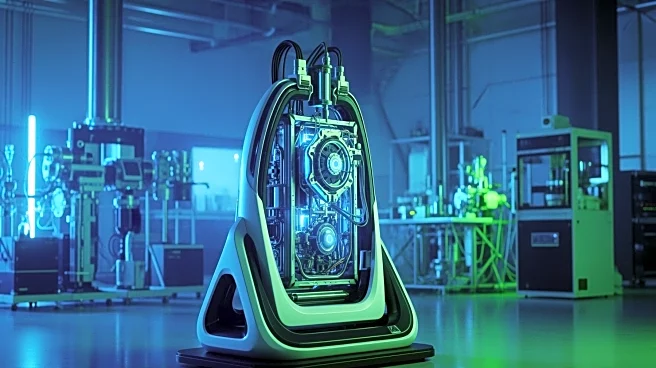What's Happening?
Mazda North American Operations is advancing its efforts to reduce carbon emissions through innovative technology. The company is developing a 'Mobile Carbon Capture' system designed to capture up to 20% of a vehicle's exhaust gases. This initiative is part
of Mazda's broader strategy to maintain the viability of internal combustion engines by making them significantly cleaner. The technology involves using CO₂ adsorbents to separate carbon dioxide from exhaust gases, which can then be stored and potentially used as raw material for recycled plastics. Mazda's Vision X-Coupe, showcased at the Japan Mobility Show, features this technology alongside a rotary engine powered by biofuel derived from microalgae. This biofuel, made from Nannochloropsis, is capable of absorbing CO₂ during its growth, offering a potential 90% reduction in emissions compared to fossil fuels.
Why It's Important?
Mazda's development of carbon-capture technology represents a significant step in the automotive industry's efforts to address environmental concerns while preserving the use of internal combustion engines. This approach could provide a transitional solution as the industry moves towards more sustainable practices. The potential to achieve a net carbon-negative result by combining biofuel with carbon-capture technology could revolutionize how emissions are managed, offering a cleaner alternative to traditional fossil fuels. This development is crucial for Mazda as it seeks to differentiate itself in a market increasingly focused on electric vehicles. If successful, this technology could influence industry standards and encourage other automakers to explore similar innovations.
What's Next?
Mazda plans to conduct demonstration testing of its carbon-capture technology at the final round of this year's Super Taikyu Series. The company aims to resolve existing challenges and move towards practical implementation. Scaling up the production of microalgae-based biofuel remains a significant hurdle, as current production rates are not yet viable for widespread use. Mazda's future efforts will likely focus on overcoming these production challenges and establishing the necessary infrastructure to support the collection and reuse of captured CO₂. The success of these initiatives could pave the way for broader adoption of carbon-capture technologies in the automotive industry.
Beyond the Headlines
Mazda's commitment to carbon-capture technology highlights the ethical and environmental responsibilities of automakers in addressing climate change. The development of such technologies could lead to long-term shifts in how emissions are managed, potentially reducing the automotive industry's carbon footprint. This approach also raises questions about the future of internal combustion engines and their role in a sustainable transportation ecosystem. As Mazda continues to innovate, the company may influence regulatory policies and consumer expectations regarding vehicle emissions and environmental impact.















